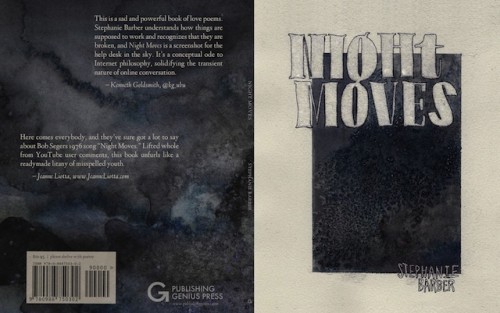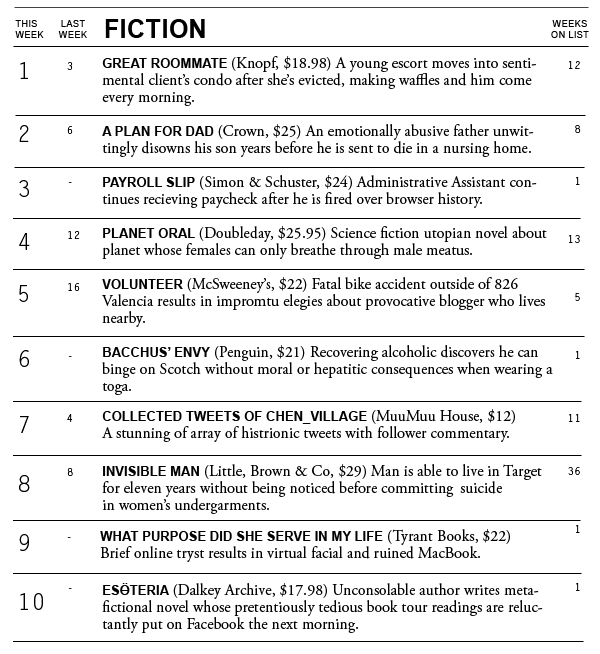Public Collection
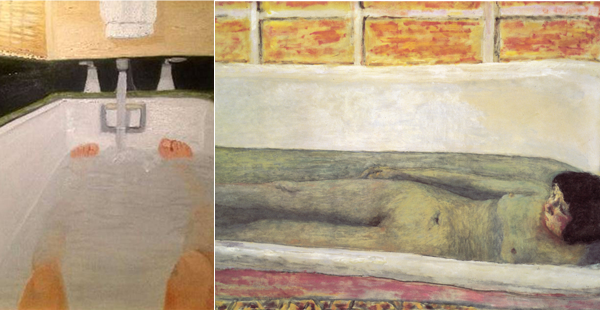
Of a kind of modesty far disproportionate to the attention it’s getting — for it would take a hacker to get into our former president’s sister’s email — amateur yet keenly perceptive paintings by George W. Bush have surfaced. They are remarkable: not so much their rendering or skill, but in their quiet internal repose, evocative of the peculiarities of the Nabis post-impressionist school. An immediate, and easy association — if one considers their respective and mindless havoc onto their perceived enemies — is Adolf Hitler, who also produced unexpected touching watercolors of churches. The imperial hubris with which Bush demonized Afghanistan at large, and later Iraq, is a sad example of turning the enemy into an abstraction. The same can be said for liberal media in their inclines against Bush; and so now, it seems, we are perplexed, and very taken aback at being allowed to see this man in a different light. It is simply hard to imagine such a heartless war monger painting such gentle paintings. Yet, the disparity lies not with Bush’s character, but the assumption that artists are somehow — by the very auspices of their art, as if introverted pastime were a moral act — essentially good people. Enter Pierre Bonnard, whose codependent relationship with his wife Marthe has kind of hilariously been documented by the many paintings of the her in the bathtub. She is said to have suffered from OCD and compulsively bathed half-a-dozen times a day, as if trying to wash away the dabs of paint for which she might have been mistaken by her husband. The pairing here is at best merely coincidental, until we look at their perspectives: George W. Bush gives us his own POV, as autoerotic muse, his phallac member just off the bottom of the canvas, perhaps the rod-like stream of water a surrogate hard on. This is the same view Marthe was having back around 1935, and toggling between the two collapses us into a kind of he-said-she-said scenario, of different versions of the same history.
NIGHT MOVES
Stephanie Barber’s new book, NIGHT MOVES (Publishing Genius), is an exquisite corpse-style collection of YouTube comments on the Bob Seger classic. It is one long epistolary poem comprised of many short poems.
The text at once contains lost youth, a melancholic longing for past loves, as well as the potential for chaos, connection, vitriol and fun within the realm of internet anonymity. NIGHT MOVES also depicts the range of responses that one piece of art can elicit, from fierce loyalty to disdain, deeply personal symbolism to some shit that somebody found by way of 30 Rock. The question of what defines poetry — found, conceptual, or otherwise — and of who can be called a “poet” is never far from the surface. Here are a few excerpts:
To Julie… where ever you are. I STILL remember the first time I saw you in psychology class, 10th grade, spring of “76”. You made the nights move for me 77-78. I will carry those memories in my heart forever, and only stop, with the last beat of my heart….
points all her own sittin way up high… << what does that mean?
I can really relate to this song as I have a daughter that is a product of the “Night Moves” and you can bet that she knows it. She is still working on the “Night Moves” what a Gal!!
NYE – OH NO WERE NOT FAR FROM IT AND AUTUM CAN’T CLOSE IN BEFORE I HAVE U TO LOVE FOREVER!! NO BACK ALLEY TRUSTED WOODS FOR MY BABYGIRL ANY MORE, BECAUSE WE DO HAVE TOO MUCH TO LOSE!! I LOVE YOU !!DADDY!! I’m coming for you soon!! OUR LOVE WILL NEVER END! REMEMBER WHEN WE WERE LIKE THIS SONG ? IM SO GLAD WE WEVE FOUND EACH OTHER ONCE MORE. IM IN LOVE WITH YOU MORE N MORE EACH DAY! (PURE) DADDY
88 people didn’t get any in high school…
Gina will never know the truth
The 60,s from Nam to Woodstock you had to experience it.God Bless America
u gotta loveee bob segar u fag, it seems like you have devoted ur fag life into talkin about bob segar
hell, i’m 81 and i love this song. anyone who was ever young has to choke a little when you hear it. it’s the best anthem of youth ever written
got me knocked up in 84
wtf is a pie in the sky summit?
this song makes me so nostalgic it actually hurts
Me too man, me too
NIGHT MOVES is a strange combination of dusty Polaroid-old and lol-contemporary. It also presents an intersection between universality and pop, and the ways that pop culture can summon universal emotions or be, in itself, a shared experience. I don’t think this book would have worked so well had it centered around Rhiannon, Dream On, Show Me the Way, Slow Ride, Dream Weaver, Carry On Wayward Son, or any other classic from the same year. There is an inherent nostalgia in the song Night Moves, an awareness of itself aging, of “autumn closing in,” which makes it a catalyst for worshipful confessions from the lovers and hilarious takedowns from the haters. I asked Barber, a Baltimore filmmaker whose work has been screened at MOMA and The Tate Modern, some questions:
hey i just met you and this is crazy but here’s my url so buy me maybe?
A Book To Read In Times Like These: Dashiell Hammett’s Red Harvest
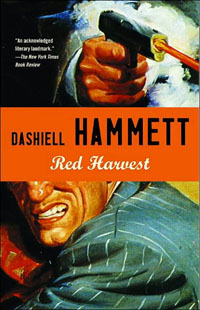 Red Harvest
Red Harvest
by Dashiell Hammett
Vintage, 1989
224 pages / $14 Buy from Amazon
We’re finished with another election cycle and it’s all same old, same old. For months we’ve been overrun by the expected crap, the lies, corruption, false promises, and general deception. While it might be nice to escape into something delightful, something by Eric Kraft or an imaginative dance like Italo Calvino’s The Baron In The Trees, if you want to read a book that stabs into the thick of the American political scene, then Dashiell Hammett’s first novel is what you need to get your claws on asap. It’s a novel that reminds you how unpleasant politics has always been. Plus, it’s got a lot of great zingers.
There’s a point when Dashiell Hammett’s Red Harvest stops being a detective story and turns into a blood bath. It’s at this point where the novel switches from being a regular tale of intrigue and personal conflict and turns into a masterful portrait of political corruption and violence. Halfway through, our man The Continental Op does a body count. “There’s been what?” he asks the devious dame Dinah Brand. “A dozen and half murders since I’ve been here.” He lists the dead and says, “That’s sixteen of them in less than a week, and more coming up.” The Continental Op copes the way they all used to. He gets drunk, takes some laudanum, and for an instant feels the rosiness of the world. He wakes up with another dead body on his hands. Another morning, another body, another hang-over. It’s a lesson in how any place or day can become a hell-trap. “If I don’t get away soon,” our man says, “I’ll be going blood-simple like the natives.”
Red Harvest is a great political novel because in the end its characters care about only one thing: power. There are no beliefs, no ideologies, no speeches. There’s just power. There are interpersonal squabbles over who killed whose brother or son, but these get forgotten in the struggle over who gets to control the quaint, ruined town of Personville, aka Poisonville. Our man The Continental Op is the only operator interested in salvaging a bit of justice from this wreckage. He sets the mobsters, police, and political head honcho up against each other and keeps prodding until more murders get committed. There’s the usual assortment of baddies and toughs, Pete the Finn, Lew Yard, Whisper, police chief Noonan, and Old Elihu, who’s the most vicious of them all and also The Continental Op’s employer.
February 8th, 2013 / 12:00 pm
Will The Real Ben Fama Please Stand Up?
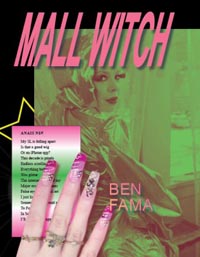 Mall Witch
Mall Witch
By Ben Fama
Wonder, November 2012
48 pages / $30 Buy from Wonder
Looking back now on the New York poetry world or “scene” in the year of the Mayan apocalypse, it remained, perhaps against all odds, a small one. Case in point: at a poets’ and small press publishers’ party in lower Manhattan I attended last year, somebody introduced me to a person (an older person, just old enough to be on the pre- side of the millennial age gap) who claimed they recognized me or had heard of me somehow via the Internet. They didn’t know my last name, but I had already told them I was a poet. It seemed we were friends on Facebook and had been for a long time. The person got out their smartphone and started scrolling through their contacts list, before asking me in complete earnest: “Are you Ben Fama?” I took it pretty well.
Mall Witch is an illustrated book of poems allegedly written in tandem by the poets Andrew Durbin and Paul Legault, ghostwriting as the poet Ben Fama. At least that’s what I was told, initially. It is the first full-length work to come out of Durbin and Fama’s mercurial publicity project called Wonder. You can read their first manifesto online in which they posit themselves as the reluctant saviors of poetry in our time. They discuss the doom of our Internet-oriented “content farm era” with MFAs, ageism, academic tyranny, and what amounts to a general lack of attention span unanimous today among an assumed readership. Taking such a fatalistic view of the contemporary landscape, they go on to promise Wonder will deliver “one last phase of innovation” or what they call “100% authentic buzz.”
About what exactly? Stylistically, Mall Witch is pure Fama all the way. For fans of Legault’s homespun ventriloquisms of John Ashbery and Emily Dickinson (some from Fence Books, or his latest from McSweeney’s) or Durbin’s precocious Frank O’Hara-style cosmopolitan lyric (Durbin is younger and a late-comer to this coterie, his poems have just begun to appear online and in some print journals) there is none of that here. It makes this reviewer truly wonder who or what actually did write Mall Witch, or what the point of any such alternative methods for the book or “buzz” really is, if all that comes out on the page in the end is the same anyway.
February 8th, 2013 / 12:00 pm
25 Points: The Bhagavad Gita
 The Bhagavad Gita: A New Translation
The Bhagavad Gita: A New Translation
by Gavin Flood and Charles Martin
W.W. Norton, 2012
167 pages / $13.95 buy from Powell’s
1. The Gita is a 700-verse scripture which is excerpted from the Hindu epic The Mahabharata. The Mahabharata is the longest Sanskrit epic known to date. The Mahabharata is over 200,000 verse lines, totaling roughly 1.8 million words and is ten times the length of the Iliad and the Odyssey combined.
2. The introduction of this translated version quotes Philip Larkin’s poem “The Explosion.”
3. I have anxiety and decided I am going to read every religious text published this year. I have never read The Bible. I am going to.
4. This section of the Mahabharata is a conversation between a prince named Arjuna and Krishna. Krishna is God for all intents and purposes. Arjuna has to go into battle but it means fighting people he loves and Krishna is trying to get him to go into battle. It’s a tough break for everybody.
5. Arjuna and Krishna are basically arguing back and forth the entire time and I was nervous though that making this claim would be disrespectful to say, one of the oldest most important religious texts in history. I wrote to one of the translators of this book. He told me that he never thought of it that way and that there have been no studies on this theory but that I quote, “Might be right, might be onto something,” and that, “It is a really interesting theory.” Well that was flattering.
6. I picture Arjuna and Krishna on a basketball court going back and forth in each other’s faces arguing except they’re arguing about the disposition of man.
7. The underlying metaphor is of course the battle for the conscious, the battle for the soul, the battle on how to live one’s life.
8. Gandhi called The Gita “his spiritual dictionary.”
9. I felt better while reading this book.
10. In the book Krishna says the way to change yourself is to focus on breathing in and out. No-matter the situation, just focus on breathing and you will be changing yourself. READ MORE >
February 7th, 2013 / 1:15 pm
Young ones, can you tell me when pizza came to be emblematic of all that is free & joyous & alive in American (and perhaps Canadian) culture? I mean, ppl always loved pizza. Pizza was v big in my day too. But there is such a proliferation of pizzapoems & pizzatweets & pizzaposts & pizzamemes & pizzagifs & cyber pizza rolls, that this momentum: 1. Eclipses the potential for any other food (say, Oreos) to gain any footing (which is fine) (but interesting). 2. Leaves me to wonder if everyone who claims to be obsessed w pizza is truly obsessed w pizza or if they are obsessed w the idea of pizza/the pizza movement/pizza as symbolic of something higher, a utopian ideal, anarchy, an eternal youthful freedom. I feel abt the pizza insurgency the way I did when I had to google the word “trill.” Same with the whole “Dad” thing. Help me.
I read THE MOON’S JAW by Rauan Klassnik and first felt pissed and then I read harder and now I can’t get the book out of my head. It’s out now.
What do you think of this “review” of American Psycho, suggesting that the violence in it can be skipped over? Anything?

